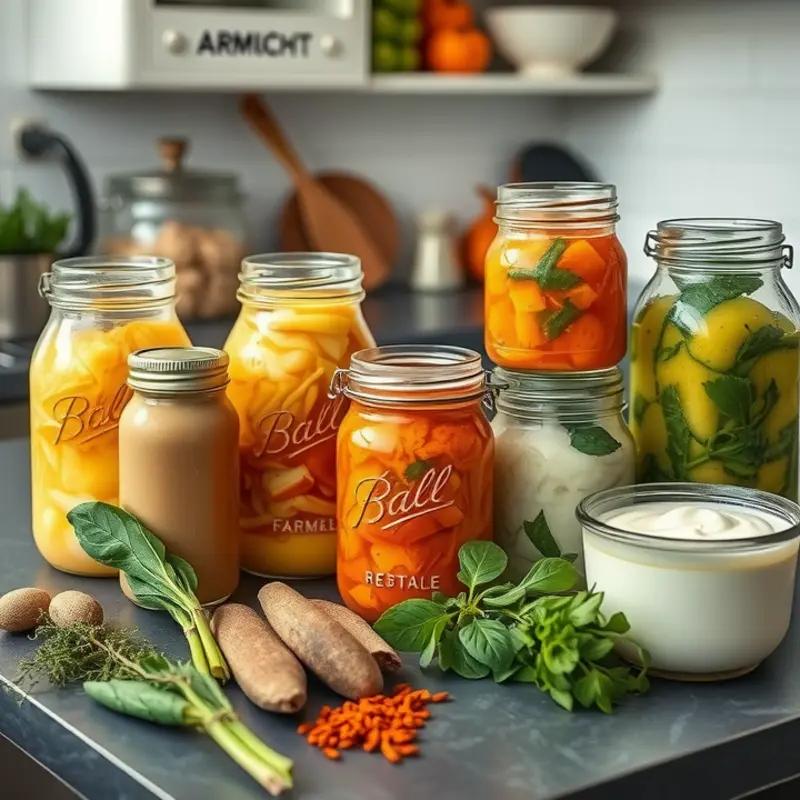Understanding gut health is crucial in today’s health-conscious environment. Gut-healing vegetarian approaches can provide clarity and practical insights for those looking to enhance their diets. With an emphasis on whole foods and nutrient-rich plants, these approaches address the needs of individuals seeking improved digestive wellness and overall health. Let’s delve into effective vegetarian strategies that support a healthy gut, explore the science behind them, and provide actionable tips to incorporate them into your daily lifestyle.
The Role of Fiber in Gut Health

Fiber is a crucial component of a vegetarian diet, essential for maintaining a healthy gut microbiome and improving digestion. Understanding the different types of fiber is key to reaping their benefits. There are two main types: soluble fiber and insoluble fiber.
Soluble fiber dissolves in water, forming a gel-like substance. It helps slow down digestion and can aid in stabilizing blood sugar levels. This type of fiber is especially beneficial for feeding the gut’s beneficial bacteria, promoting a healthy intestinal environment. Good sources of soluble fiber include oats, apples, berries, and legumes like lentils and beans. For those following a vegetarian diet, incorporating these foods is relatively easy and can lead to noticeable improvements in gut function.
Insoluble fiber, on the other hand, does not dissolve in water. It adds bulk to the stool, which helps food pass more quickly through the digestive tract. Foods rich in insoluble fiber include whole grains, nuts, seeds, and vegetables such as carrots and broccoli. This type of fiber supports regular bowel movements and can prevent constipation, a common digestive complaint.
A balanced vegetarian diet that includes a variety of both soluble and insoluble fiber sources can enhance gut health and improve overall digestive efficiency. For instance, a breakfast of oatmeal combined with fresh fruit can provide a hearty dose of soluble fiber, while a dinner featuring whole grain bread and a side of vegetables offers insoluble fiber benefits.
Incorporating fiber-rich foods into your meals doesn’t have to be mundane. Explore creative recipes that emphasize fiber without compromising flavor. Consider adding diversity to your meals with nutrient-dense grains like quinoa, bulgur, or barley, and blend them with colorful, fiber-rich vegetables. Snacks such as nuts and seeds also make a convenient and wholesome addition to daily nutrition.
As you adapt to a higher fiber intake, it’s important to increase your water consumption to facilitate the fiber’s movement through your digestive system and minimize potential discomfort. Begin by gradually introducing more fiber to your diet, allowing your gastrointestinal tract to adjust accordingly.
For additional insights on creating balanced meals rich in fiber while adhering to a plant-based diet, explore options and expert advice shared here. This resource provides guidance on making plant-based eating easy and sustainable, ensuring you enjoy the full spectrum of nutritional benefits.
By prioritizing fiber in your vegetarian diet, you not only support a healthy gut but also contribute to a well-rounded, nutrient-dense dietary pattern that enhances both digestive well-being and overall health.
Probiotics and Prebiotics: The Dynamic Duo

The symbiotic relationship between probiotics and prebiotics forms a cornerstone of digestive health. Probiotics are live microorganisms, mainly bacteria and yeast, that offer health benefits when consumed in adequate amounts. Prebiotics, on the other hand, are non-digestible food components that fuel the growth of beneficial bacteria in the gut. Together, they create an environment where good bacteria can thrive, maintaining digestive equilibrium.
Fermented vegetarian foods are abundant sources of probiotics. When food is fermented, it relies on natural bacteria to begin digesting its sugars, leading to the development of probiotic cultures. Fermented foods like sauerkraut, kimchi, and kombucha are teeming with these live microorganisms. These foods introduce beneficial strains such as Lactobacillus into the digestive system, reinforcing the gut flora.
To incorporate fermented foods into your diet, start small and gradual. Add a spoonful of sauerkraut to your salads or sandwiches. Experiment with kimchi as a spicy side dish. Sipping a glass of kombucha provides not only probiotics but also a fizzy, refreshing taste that can substitute sugary drinks. For more plant-based probiotic sources, consult a non-dairy probiotics guide, specifically tailored to those following vegetarian diets.
Prebiotics serve as nourishment for probiotics. They include fiber-rich plant foods that are indigestible to humans but serve as a feast for our gut bacteria. Foods high in prebiotics include garlic, onions, asparagus, and bananas. Incorporating these into daily meals ensures that your probiotic colonies remain well-fed and flourishing.
Cooking with prebiotics can be simple yet effective. Garlic and onions, rich in inulin—a notable prebiotic fiber—add depth to various dishes. Roasting asparagus or tossing bananas into your morning oats can boost your prebiotic intake effortlessly.
Balancing probiotics and prebiotics is crucial for maintaining a healthy gut. While probiotics play an active role in resolving imbalances, prebiotics reinforce and support long-term bacterial health. A diet incorporating both provides a comprehensive approach to enhancing microbiome diversity and stability, promoting digestive health.
This harmonious balance opens the door to numerous health benefits, from improved digestion and nutrient absorption to a bolstered immune response. As research continues to reveal more about this dynamic duo, it’s evident that lifelong gut wellness begins with mindful dietary choices, leveraging the natural power of plant-based foods.
Final words
Incorporating gut-healing vegetarian approaches into your diet can significantly impact your digestive health and overall well-being. By focusing on fiber-rich foods, along with the powerful benefits of probiotics and prebiotics, you can cultivate a thriving gut microbiome. These strategies not only support digestion but can also enhance your energy levels and immune function. With a wealth of delicious vegetarian options, this journey into gut health can be as enjoyable as it is beneficial. Embrace these dietary changes, listen to your body, and watch as your health flourishes.








